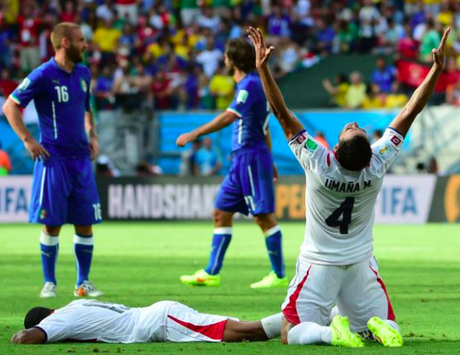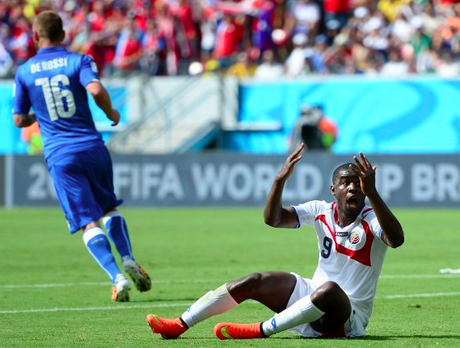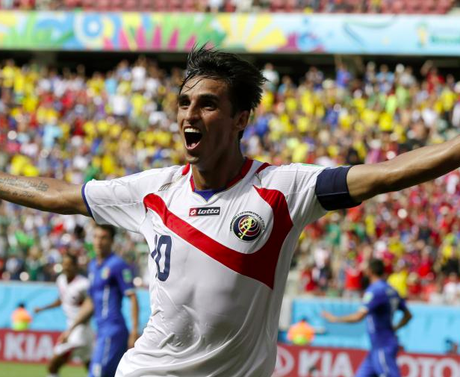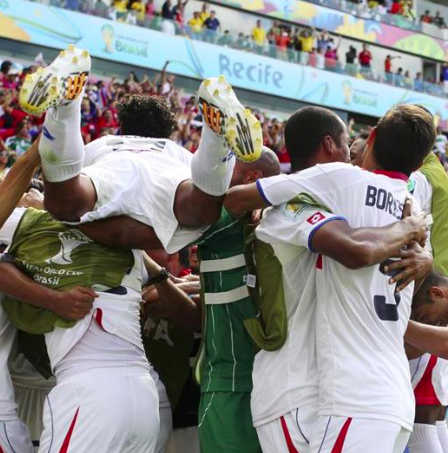 Recife, San Jose, Milan, and London. Four cities, far removed from each other in every way imaginable; distance, culture, economic status. The only thing uniting these disparate cities last night, was their collective interest in the outcome of the match between Italy and Costa Rica. Recife, the city playing host to this crucial Group D encounter was the epicentre of what was nothing short of an earthquake, in a footballing sense, that sent shockwaves across the vast stretches of the Pacific and Atlantic to leave London in a deep malaise, and Milan on the brink.
Recife, San Jose, Milan, and London. Four cities, far removed from each other in every way imaginable; distance, culture, economic status. The only thing uniting these disparate cities last night, was their collective interest in the outcome of the match between Italy and Costa Rica. Recife, the city playing host to this crucial Group D encounter was the epicentre of what was nothing short of an earthquake, in a footballing sense, that sent shockwaves across the vast stretches of the Pacific and Atlantic to leave London in a deep malaise, and Milan on the brink.Though they may not have fully appreciated the magnitude of their achievement at the time, the Costa Ricans were as euphoric and upbeat as anyone on the planet and for a few brief moments post the final whistle, Recife was a suburb of San Jose, Costa Rica. Prior to the match, the Azzuri’s Daniele de Rossi, emphasized the importance of his team not underestimating the potential of their South American opponents. He also spoke of the transformation that the World Cup has witnessed over the years, resulting in an unparalleled level of competition. “There are no teams that are here to just make up the numbers, and concede six, seven goals every game. That may have been the case many years ago, but not now”.
 In retrospect, a cynic wouldn’t be incorrect to call those comments excessively flattering and misrepresentative of the Italian mindset. It was evident come kick-off that the confidence gained after their defeat of England had evolved into it’s own worst enemy, overconfidence. The Italians expecting a stroll in the park were thwarted on all levels by a resolute and well organized Costa Rican side. Andrea Pirlo and de Rossi were not afforded any time and space on the ball as the Italian attack was often broken down in it’s tracks. With an overload of players in the center of the park, the Italian passing game hardly got going.
In retrospect, a cynic wouldn’t be incorrect to call those comments excessively flattering and misrepresentative of the Italian mindset. It was evident come kick-off that the confidence gained after their defeat of England had evolved into it’s own worst enemy, overconfidence. The Italians expecting a stroll in the park were thwarted on all levels by a resolute and well organized Costa Rican side. Andrea Pirlo and de Rossi were not afforded any time and space on the ball as the Italian attack was often broken down in it’s tracks. With an overload of players in the center of the park, the Italian passing game hardly got going.Mario Balotelli cut an isolated figure for much of the game and his contribution to the Italian cause amounted to nothing more than a few wayward shots and the customary yellow card, this time, for a perplexing elbow into the face of a Costa Rican defender, acres away from the ball. The wing play which the Azzurri used so effectively against England failed to pay any dividends this time out with Antonio Candreva having an unusually quiet game on the right flank.
Take nothing away from the Costa Ricans, however. Undaunted by the challenge that faced them, they defended sternly, attacked with purpose and did not at all look a team placed 19 places below the Italians. A lesser side may have been content to just allow the Azzurri to have the ball and defend deep. To their credit, they pressed the Italians high up the pitch and quelled any move just as it seemed to be gathering steam.
 Prior to their opening goal, Joel Campbell continuing his good run of form in the tournament was extremely unlucky to not have been awarded a penalty for a blatant barge by Giorgio Chiellini. Whether it was the presence of Andrea Barzagli that may have dissuaded the referee in blowing his whistle, it cannot be said. Leading the vehement Costa Rican remonstrations, Jorge Luis Pinto looked as though he was going to have a fit. Luckily enough for him, justice was done a couple of minutes later as captain Brian Ruiz headed home a superb cross from Junior Diaz. Ironically, the goal, requiring confirmation from goal line technology would turn out to be the damning goal for England just as it’s absence damned them four years ago.
Prior to their opening goal, Joel Campbell continuing his good run of form in the tournament was extremely unlucky to not have been awarded a penalty for a blatant barge by Giorgio Chiellini. Whether it was the presence of Andrea Barzagli that may have dissuaded the referee in blowing his whistle, it cannot be said. Leading the vehement Costa Rican remonstrations, Jorge Luis Pinto looked as though he was going to have a fit. Luckily enough for him, justice was done a couple of minutes later as captain Brian Ruiz headed home a superb cross from Junior Diaz. Ironically, the goal, requiring confirmation from goal line technology would turn out to be the damning goal for England just as it’s absence damned them four years ago.The timing of the goal could not have been better, as Costa Rica went into the dressing room at halftime, 1-0 up and full of confidence. Much to the credit of Cesare Prandelli, changes were made almost instantly in the second half with veteran Parma forward Antonio Cassano coming on at the expense of Thiago Motta in an effort to bolster the attack.
Despite a few lively exchanges between Cassano and Balotelli early on, there were no clear cut opportunities created in the first fifteen or so minutes of the second half, which prompted the rising stars of the Serie A, Lorenzo Insigne and Alessio Cerci to be brought on for the ineffective Candreva and tired looking Claudio Marchisio. Insigne, like his colleagues had no room whatsoever to exhibit his blistering pace and dribbling skills while Cerci fought an isolated battle on the left.
As the Italians committed an increasing number of players forward, they left themselves exposed at the back and were lucky not to have picked off on the break. Had substitute Randall Brenes exhibited better finishing, the Costa Rican joy would have had no bounds, as if it didn’t already.
 In a group where they were paired alongside three previous World Cup winners, all in the top 10 of the FIFA rankings, no one would have imagined that they would be the first to qualify out of it. They were supposed to be the easy 3 points. They were supposed to the minnows, victory over whom would be the launchpad for two out of the big three to qualify for the knockout stages. Instead, they have been the launchpad for two out of the big three to be knocked out.
In a group where they were paired alongside three previous World Cup winners, all in the top 10 of the FIFA rankings, no one would have imagined that they would be the first to qualify out of it. They were supposed to be the easy 3 points. They were supposed to the minnows, victory over whom would be the launchpad for two out of the big three to qualify for the knockout stages. Instead, they have been the launchpad for two out of the big three to be knocked out.In retrospect, de Rossi was right. There are no minnows, no teams that are there just to make up the numbers in the grandest of all footballing stages. It’s just a shame how his team failed to practice what they so astutely preached. Whether it will cost them big will be determined on Tuesday night as they take on a formidable Uruguay side in a winner takes all match.

